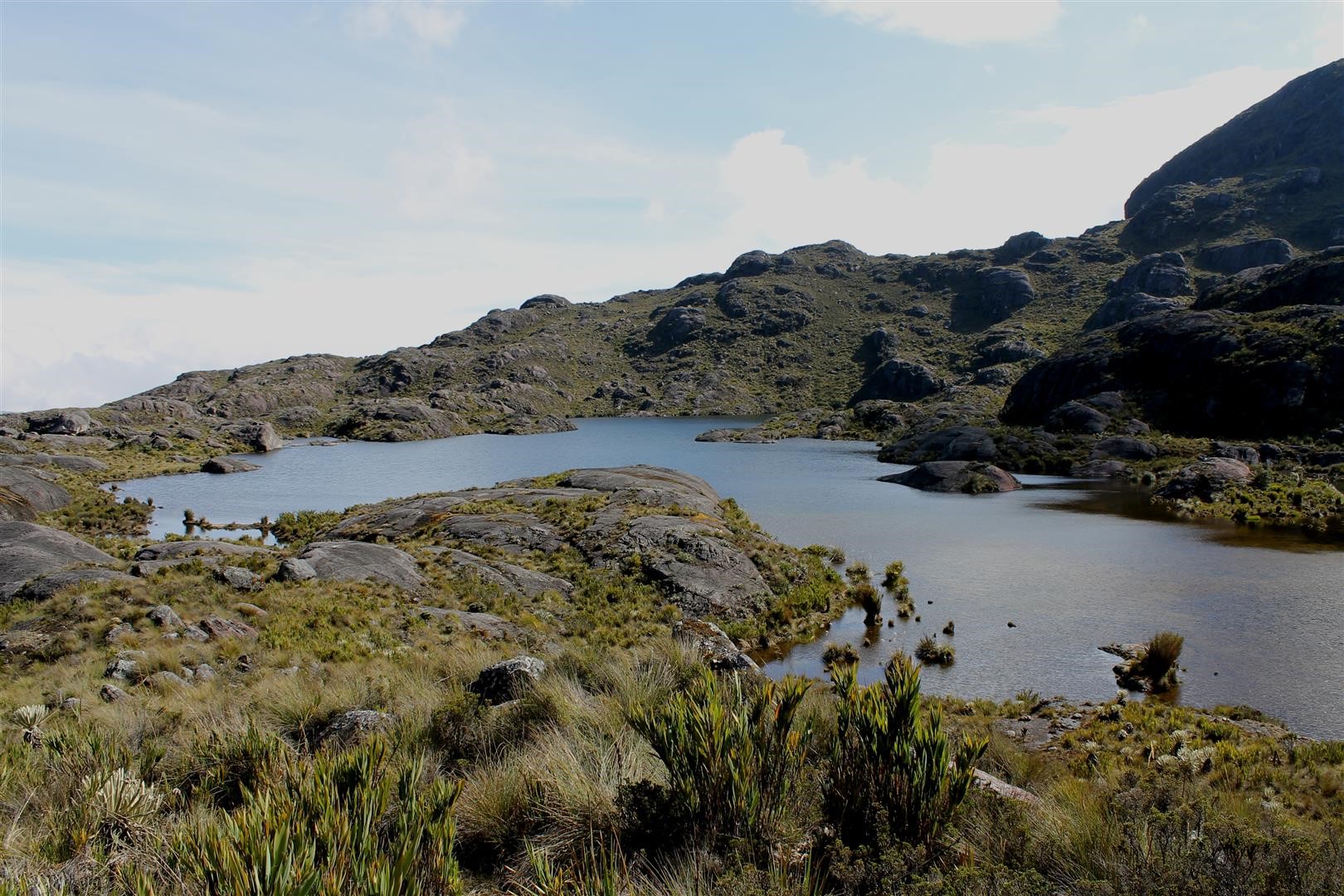Abstract
The high Andean wetlands, "Paramo" of Santurbán, is a natural region located in the departments of North of Santander and Santander in Colombia. It is part of the three million hectares of this ecosystems in Colombia, that represents about half of the Andean high Andean wetlands that are the key resource of fresh water production for more than 25 million Colombians. There is concern, at different social and political levels, to find and create options to protect these ecosystems to ensure the social and economic development of the country. This situation shows the important challenges that must be addressed on the ground with a special consideration that includes the populations directly affected, those that cohabitate with the high Andean wetlands and water sources, relying on the environment for their sustenance. The Water Benefit certificates would offer a real option to provide alternatives for the conservation of high Andean wetlands, with the people creating an option, which allows the upper basin and lower basin people, to identify and quantify the benefits shared between them through a simple, voluntary, and trustworthy way

Caption: Quelpa Lake in Cucutilla, Norte De Santander, in the Sisavita Natural Parc.
Context
A few years ago, environmental services were generally ignored and undervalued. Currently, there is a clear trend towards recognition of the environment as a provider of vital environmental services for society, which fuels a growing social sensitivity towards the sustainability relationship that needs to exist between strategic ecosystem suppliers and the people who demand and depend on these services, and the effects of economic activities; not only from the viewpoint of the necessary compensation for negative impacts, but also the necessary manifestation of co-responsibility for the conservation of a vital element for social and economic development. These characteristics make it especially important to talk about the environmental markets.
Environmental markets are based on operations where a beneficiary of an environmental service generates an economic incentive, in cash or kind, to compensate for the provision of environmental services offered by that area.
According to the traditional meaning of environmental services, these incorporate a wide range of possibilities, including provision (water, food, others), regulation (carbon, climate regulation, others), support (nutrients, others), and cultural (Inspiration, motivation, ecotourism, others).
This article is focused on the hydrological environmental service of water supply, associated to the production of water in quantity and quality and sediments retention. These water environmental services are clearly defined in terms of their characteristics and the process by which they are provided and generate benefits. However, in terms of quantification, valuation, and verification and the calculation of the subsequent value of a compensation for them, there are new variables that are include a high complexity related to the innovation involved in the environmental market model.
The high Andean wetlands of Santurban (Páramo de Santurbán) is the water source for more than two million people in two departments of Colombia (North of Santander and Santander) and is a key natural resource for the social and economic development of two main cities: Cucuta and Bucaramanga, the seventh and sixth largest metropolitan areas in the country, respectively.
Problem
This strategic area for water sources in the region has been highly impacted by production processes related to agriculture, livestock, and mining; that the Ministry of Environment and Sustainable Development of Colombia (MADS) issued in December 2014 legal act 2090 which introduced some restrictions of land use in the territory of the high Andean wetlands for Santurbán Nevertheless, the threats to the Santurbán remain in the new legal context, which generates a significant advancement in conservation possibilities, but does not offer clear and actual alternatives for the population, for that reason a social conflict has arisen with the population that live in Santurbán for several decades and generations. The people demand actual alternatives to participate in the conservation of the water sources, without giving up the areas where they live and their quality of life.
Innovative Solution
The project for the development and implementation of a technical financial plan of Water Benefit Certificates (WBC), as a long-term strategy for the conservation of the high Andean wetlands of Santurban (Paramo de Santurbán), has been under development since June 2016. This project is being carried out with the international co-financing of the Swiss Embassy in Colombia with the Swiss Agency for Cooperation and Development (SDC), the German Cooperation (GIZ), and with the local co-financing of the Alianza BioCuenca (Trust fund of North of Santander), head of the regional political authority, the Governor of North of Santander, and the regional environmental authority - CORPONOR - and Good Stuff International Latin America and the Caribbean -- GSI-LAC.
The project is focused on the implementation of an innovative and sustainable mechanism, with a strong scientific base, which will generate incentives for conservation, for and with the people that live in the Santurbán. The project is being developed in the municipality of Mutiscua, which is located in North of Santander, in the headwaters of the Zulia river basins, which is one of the main sources of water for the metropolitan area of Cúcuta, which is also a water source of an important population in the neighbouring country, Venezuela.
Adding Value
The project includes three work paths that respond to the different phases and that are developed in a coordinated way: 1.) Technical line, 2.) Line of political harmonization, 3.)- Market line, and 4.)- Line of communication (transversal throughout the whole project.)
Technical Line: The technical line focuses on a detailed and rigorous definition, characterization, measurement, validation, and verification of the Water Benefit of the high Andean wetland conservation (BHP). This approximation should incorporate the social vision of the people of the high Andean wetland, that extends the concept to Integral Water Benefit of the Paramo conservation (BHIP), and generates a basic input for the correct valuation of the water environmental service that supports the market possibilities with clearly defined value and verified elements. With this information, supported additionally with a strong legal and political base and with a market strategy, there must be the creation of a flow of resources that shows that improving the economic income condition of the people, could promote the conservation of the high Andean wetlands with the sustainable population development.
Political Harmonization Line: This mechanism will generate a tool that governments, companies, and the populations located in the big cities, understand and appropriate the possibilities of participation in protection practices of the water sources, forest, and high Andean wetlands, in an innovative way.
Market Line: Through a market transaction that involves a Certificate of Water Benefit, which reliably, quickly, simply, and voluntarily generates compensation for the water that uses/contaminates and thus makes tangible the effective relationship between the payment and the integral water benefit for conserving the high Andean wetlands. In this way, a new alternative of conservation linkage is offered, allowing effective participation and interaction in real time, of the land that produces water, the cities that demand water, and its people who depend on the water for social and economic development.
Model Basics
The Water Benefit Certificates model is based on the generation of trust as a fundamental support for a voluntary economic decision, which starts with the knowledge and recognition of the existence of a co-responsibility for the preservation of a collective heritage, the fresh water.
The different lines of work: technical, political, market, and communication; which maintain a simultaneous and interdependent development, provide the different elements that contribute three key foundations for the operation of the model that makes it possible to increase trust in mechanism:
Simplicity: Solve simple questions with simple answers, but with a robust and rigorous scientific basis and with independent verification and validation, offered by an impartial third party.
Political Harmony: The correct coordination with the political influencers who have jurisdiction in the high mountain area and in the regulation of environmental services at country level is fundamental in the process of generating trust.
Information: Clear, simple, available, and concrete information is a key factor for the correct work of the mechanism. Information on the environmental service must be generated (answers the questions: Why? Where?), about the financial technical scheme (answers the questions: How? How much? How to invest? How could I check?), about shared benefits generated (responds to the questions: For what? How does it affect me directly?).
Conclusion
The creation of sustainable alternatives that recognize all the stakeholders involved, by giving them equal weight and including the population in the process of conservation and restoration. The Water Benefits Certificates are currently demanded by the institutions and those that are located in upper basin and lower basin whose dependency on the land generates a territorial and social impact uniting their positions. They also contribute to enabling conservation based on knowledge, conscience, and coordinated and reliable commitment of both sides.
The process is still moving forward and the implementation project in Santurbán will be completed by the end of 2018. The effective linking and conservation of equivalent or at least non-dependent evolutionary rhythms between local processes with institutions and local people, with the technical and political processes that are developed at the departmental and national levels, continue to be one of the main challenges for the future. Therefore, mitigation mechanisms have been implemented that are independent of structural processes and allow time to plan connection points, so that they offer the minimum risk with maximum effectiveness in the process.
Finally, the current political context in Colombia is favorable with several political, institutional, and social manifestations that are generating a clear recognition of the environmental value of conservation and strategic ecosystems. The most recent demonstration was the legal act 870 of May 25, 2017, from the Environmental Ministry of Colombia, which established the payment for environmental services and other incentives to environmental conservation, as a tool for the promotion of public and private strategies aimed at protecting areas of particular ecosystem importance in the present post-conflict framework. The harmonious coordination of the plan of Certificates of Water benefit applied to high Andean wetlands ecosystems generates a feedback of the planning from the local experience and the regulation from the instances of the state, which will be beneficial and necessary for both parties.
Author Bio

Diego Arevalo Uribeis a Civil Engineer from University of los Andes, Colombia, with a master's degree in Hydrology from the Centre for Studies and Experimentation of Public Works of the Ministry of Public Works of Spain; Researcher and Consultant specialized in Integrated Management of Water Resources. Two of his main themes of research in recent years have been the water footprint and technical - financial mechanisms for conservation, including the Water Funds, with which he has been director and technical adviser of projects in several countries: Colombia, Peru, Spain, Costa Rica, and Argentina. He is currently Regional Director for Latin America and the Caribbean at Good Stuff International (GSI), based in Medellin. GSI is an international consulting company with a presence in the Netherlands, Switzerland, Kenya, Spain, and Colombia, dedicated to the development of projects focus on sustainable water management.
Diego can be contacted by email at: This email address is being protected from spambots. You need JavaScript enabled to view it..


